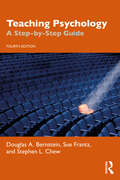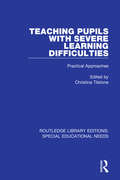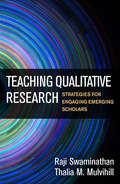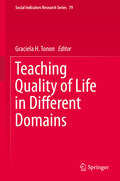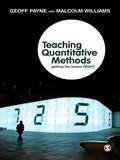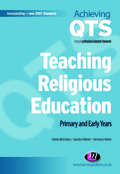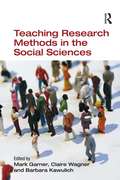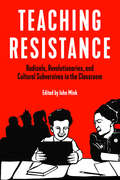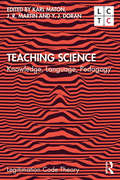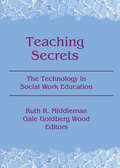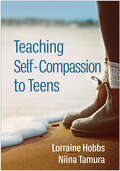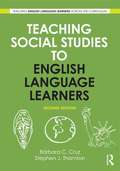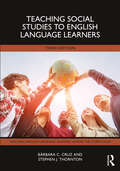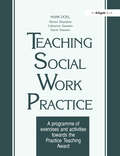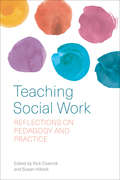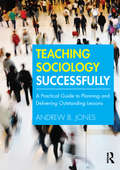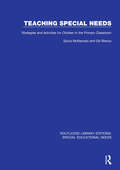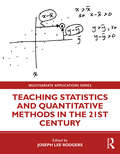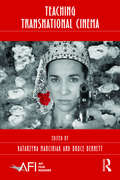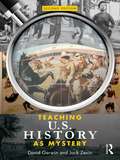- Table View
- List View
Teaching Psychology: A Step-by-Step Guide
by Douglas A. Bernstein Sue Frantz Stephen L. ChewNow in its fourth edition, Teaching Psychology: A Step-By-Step Guide synthesizes the latest pedagogical research on effective teaching and translates it into recommendations for classroom application. It explores the rapidly changing academic landscape and offers innovative ideas for teaching psychology and creating inclusive classrooms where all students can experience a sense of belongingness and psychological safety.This comprehensive volume covers key topics such as planning a course, choosing teaching methods that promote well-being, diversity and inclusion, assimilating technology (including Artificial Intelligence), and the integration of teaching into the rest of your academic life. The authors include an abundance of supportive, supplementary content to guide and inform new teachers, including their own real-life anecdotes and examples. Fully revised throughout, this new edition analyses updated research on topics such as student evaluations of teaching, establishing the value of your courses, student motivation, and trigger warnings. This edition also features a completely new chapter on teaching psychology abroad and focuses on the goals of post-pandemic teaching, including harnessing the power of online and hybrid teaching environments.Presenting a valuable and cutting-edge guide for psychology teachers, this book is a vital resource for those who are training psychology instructors or undertaking a teaching psychology course. It is also a useful text for more experienced faculty who wish to reevaluate their current teaching practices and explore new teaching ideas and techniques.
Teaching Pupils with Severe Learning Difficulties: Practical Approaches (Routledge Library Editions: Special Educational Needs #54)
by Christina TilstoneFirst published in 1991. This book provides a comprehensive view of the needs of pupils with severe learning difficulties and considers the attitudes of parents, teachers, administrators and the pupils themselves. It offers practical approaches to assessment and curriculum design; the management of the classroom environment; approaches to classroom evaluation; pupils from minority groups; collaboration with other professionals; integration and stress and the classroom teacher.
Teaching Qualitative Research: Strategies for Engaging Emerging Scholars
by Raji Swaminathan Thalia M. MulvihillThis timely resource provides a framework for teaching students how to think qualitatively and become more critical and reflexive researchers. Presented are a wealth of pedagogical tools that instructors across the disciplines can tailor to their own needs, including thought-provoking discussion questions, group work exercises, and field activities. The authors discuss issues and choices in course design, including approaches to assessment and grading, and share sample syllabi for both online and face-to-face course formats. Exploring the complexities and debates that surround teaching qualitative research, the book argues for a holistic model of preparing novice researchers. It demonstrates effective ways to engage students in the qualitative inquiry process from start to finish--from understanding positionality and crafting a research problem to writing up findings for different audiences.
Teaching Quality of Life in Different Domains (Social Indicators Research Series #79)
by Graciela H. TononThis is the first volume addressing the importance of teaching quality of life theory and methodology in different domains: social sciences, philosophy, sociology, political science, marketing, education, urbanism, statistics, economics, online learning, public health, sports, and constraint contexts in terms of their relationship with the Capability Approach. The chapters are written by important authors from Europe, North America, Asia, Latin America, Africa and Oceania, and present the syllabus and references of courses, making this volume important and necessary to university professors, students as well as teachers in general.
Teaching Quantitative Methods: Getting the Basics Right
by Matthew Williams Geoff PayneThis exciting collection is both useful and timely. It clearly lays out the problems, strategies and resources associated with the teaching of quantitative methods in modern universities. Addressing the perceived 'crisis of number' in a practical and fresh way the book sets out dynamic new approaches to teaching quantitative methods. It offers historical, comparative, analytical reflection and empirical evidence concerning the crisis in contemporary social sciences. Experts from across the social sciences provide a wide range of authoritative insights as well as a number of useful illustrations of strategies and resources designed to help overcome this 'crisis of number'. Each chapter reflects the diversity of backgrounds and approaches within the social sciences making this an interdisciplinary, relevant addition to the subject. The book also: o focuses on innovations in how to teach quantitative research methods o reports on the latest ESRC research projects on teaching quantitative methods o locates itself within current debates about skills for employment. Clear, engaging and original this book will be essential reading for those interested in learning and teaching quantitative methods.
Teaching Race and Anti-Racism in Contemporary America
by Kristin HaltinnerThis book presents thoughtful reflections and in-depth, critical analyses of the new challenges and opportunities instructors face in teaching race during what has been called the "post-racial era". It examines the racial dimensions of the current political, economic, and cultural climate. The book features renowned scholars and experienced teachers from a range of disciplines and offers successful strategies for teaching important concepts through case studies and active learning exercises. It provides innovative strategies, novel lesson plans and classroom activities for college and university professors who seek effective methods and materials for teaching about race and racism to today's students. A valuable handbook for educators, this book should be required reading for all graduate students and college instructors.
Teaching Religious Education: Primary and Early Years (Achieving QTS Series)
by Sandra Palmer Veronica M Voiels Elaine McCreeryMany trainee primary teachers are uncertain as to the place and purpose of RE in primary schools. This book is designed to alleviate such fears and give trainees the security and confidence to teach RE effectively. Trainees are encouraged to recognise their own religious position and understand how they handle their own beliefs and commitments in the classroom. In addition, they will learn how to be sensitive to children′s religious viewpoints, allowing children to share their beliefs in a secure and supportive environment. A range of strategies help readers to provide engaging and appropriate RE across the primary age phase.
Teaching Research Methods in the Social Sciences
by Mark Garner Claire Wagner Barbara KawulichHow can excellence in the teaching of research methods be encouraged and ensured? This question has become increasingly important following the adoption of research methodology as a core part of many postgraduate and undergraduate courses. There has, however, been little discussion about the aims and methods of teaching the subject. In this volume; a number of authors from a variety of countries and disciplines employ their knowledge and experience towards the development of a 'pedagogical culture' in research methods. Their aim is to establish the extent of common concerns and challenges and to demonstrate ways in which these are being met. Intended to provide both a stimulus and source materials for the development of a more substantial and systematic literature in the field, the book will be of great interest to all those teaching research methods courses within social science disciplines.
Teaching Resistance: Radicals, Revolutionaries, and Cultural Subversives in the Classroom
by John MinkTeaching Resistance is a collection of the voices of activist educators from around the world who engage inside and outside the classroom from pre-kindergarten to university and emphasize teaching radical practice from the field. Written in accessible language, this book is for anyone who wants to explore new ways to subvert educational systems and institutions, transform educational spaces, and empower students and teachers to fight for genuine change. Topics include community self-defense, Black Lives Matter and critical race theory, intersections between punk/DIY subculture and teaching, ESL, anarchist education, Palestinian resistance, trauma, working-class education, prison teaching, the resurgence of (and resistance to) the Far Right, special education, antifascist pedagogies, and more. Edited by social studies teacher, author, and punk musician John Mink, the book features expanded entries from the monthly column in the politically insurgent punk magazine Maximum Rocknroll, plus new works and interviews with subversive educators. Contributing teachers include Michelle Cruz Gonzales, Dwayne Dixon, Martín Sorrondeguy, Alice Bag, Miriam Klein Stahl, Ron Scapp, Kadijah Means, Mimi Nguyen, Murad Tamini, Yvette Felarca, Jessica Mills, and others.
Teaching Science Students to Communicate: A Practical Guide
by Susan Rowland Louise KuchelThis highly-readable book addresses how to teach effective communication in science. The first part of the book provides accessible context and theory about communicating science well, and is written by experts. The second part focuses on the practice of teaching communication in science, with ‘nuts and bolts’ lesson plans direct from the pens of practitioners. The book includes over 50 practice chapters, each focusing on one or more short teaching activities to target a specific aspect of communication, such as writing, speaking and listening. Implementing the activities is made easy with class run sheets, tips and tricks for instructors, signposts to related exercises and theory chapters, and further resources. Theory chapters help build instructor confidence and knowledge on the topic of communicating science. The teaching exercises can be used with science students at all levels of education in any discipline and curriculum – the only limitation is a wish to learn to communicate better! Targeted at science faculty members, this book aims to improve and enrich communication teaching within the science curriculum, so that science graduates can communicate better as professionals in their discipline and future workplace.
Teaching Science: Knowledge, Language, Pedagogy (Legitimation Code Theory)
by J. R. Martin Karl Maton Y. J. DoranScience has never been more important, yet science education faces serious challenges. At present, science education research only sees half the picture, focusing on how students learn and their changing conceptions. Both teaching practice and what is taught, science knowledge itself, are missing. This book offers new, interdisciplinary ways of thinking about science teaching that foreground the forms taken by science knowledge and the language, imagery and gesture through which they are expressed.This book brings together leading international scholars from Systemic Functional Linguistics, a long-established approach to language, and Legitimation Code Theory, a rapidly growing sociological approach to knowledge practices. It explores how to bring knowledge, language and pedagogy back into the picture of science education but also offers radical innovations that will shape future research.Part I sets out new ways of understanding the role of knowledge in integrating mathematics into science, teaching scientific explanations and using multimedia resources such as animations. Part II provides new concepts for showing the role of language in complex scientific explanations, in how scientific taxonomies are built, and in combining with mathematics and images to create science knowledge. Part III draws on the approaches to explore how more students can access scientific knowledge, how to teach professional reasoning, the role of body language in science teaching, and making mathematics understandable to all learners.Teaching Science offers major leaps forward in understanding knowledge, language and pedagogy that will shape the research agenda far beyond science education.
Teaching Secrets: The Technology in Social Work Education
by Ruth Middleman Gale Goldberg WoodTeachers and student teachers in social work will gain valuable insight into the artistry that makes truly great teaching from the accounts found in this new book. Master teachers examine the processes they use in the classroom and present them in a format that facilitates the practical application of their ideas. The teaching methods recounted here emphasize the learners as the most important component of the teaching/learning experience and demonstrate techniques to enliven and enhance the reader’s own teaching methods. This vital book focuses on teaching “technologies,” defined as bodies of knowledge or skills ordered for use, that are comprised of techniques or systematic procedures that bring the technologies to life. By utilizing the techniques and technologies portrayed in this volume, social work educators at the graduate and undergraduate levels will become more effective at reaching their students and helping them grow into professional social workers.Teaching Secrets helps teachers increase the effectiveness of their teaching by demonstrating how to pay attention to acts and nuances that stimulate and assist students in their learning. Individual chapters focus on specific classroom environments, providing practical advice to improve learning in each situation. Social work teachers will discover more effective teaching through the use of student journals, the use of self in teaching doctoral research, the use of authority, and the benefits of student-student learning in work groups. Other chapters offer practical advice on reaching different groups of students such as black teachers leading white students, white teachers leading black students, and special efforts for reaching female students. This exciting book reveals that great teachers are not born but made, and shares the secrets that will help all social work educators to develop greatness in their own classrooms.
Teaching Self-Compassion to Teens
by Lorraine Hobbs Niina TamuraGrounded in knowledge about the unique developmental challenges of adolescence, this book presents an innovative approach for teaching self-compassion to teens and young adults in clinical, educational, or community settings. Lorraine Hobbs and Niina Tamura provide guided practices, creative exercises, and teaching strategies adapted from Kristin Neff and Christopher Germer&’s widely disseminated Mindful Self-Compassion program for adults. Case examples, sample dialogues, and scripts illustrate how to set up and run successful groups that address teen concerns such as self-criticism, self-esteem, social comparison, and strong emotions. The book offers guidelines for cultivating a personal practice and working with parents. Tips for providing a safe, effective learning environment are woven throughout; a special chapter covers trauma-sensitive teaching.
Teaching Shakespeare Beyond the Major
by M. Tyler Sasser Emma K. AtwoodThis edited collection considers the task of teaching Shakespeare in general education college courses, a task which is often considered obligatory, perfunctory, and ancillary to a professor’s primary goals of research and upper-level teaching. The contributors apply a variety of pedagogical strategies for teaching general education students who are often freshmen or sophomores, non-majors, and/or non-traditional students. Offering instructors practical classroom approaches to Shakespeare’s language, performance, and critical theory, the essays in this collection explicitly address the unique pedagogical situations of today’s general education college classroom.
Teaching Social Studies to English Language Learners
by Stephen J. Thornton Bárbara C. CruzTeaching Social Studies to English Language Learners provides readers with a comprehensive understanding of both the challenges that face English language learners (ELLs) and ways in which educators might address them in the social studies classroom. The authors offer context-specific strategies for the full range of the social studies curriculum, including geography, U.S. history, world history, economics, and government. These practical instructional strategies will effectively engage learners and can be incorporated as a regular part of instruction in any classroom. An annotated list of web and print resources completes the volume, making this a valuable reference to help social studies teachers meet the challenges of including all learners in effective instruction. Features and updates to this new edition include: • An updated and streamlined Part 1 provides an essential overview of ELL theory in a social studies specific-context. • "Teaching Tips" offer helpful suggestions and ideas for creating and modifying lesson plans to be inclusive of ELLs. • Additional practical examples and new pedagogical elements in Part 3 include more visuals, suggestions for harnessing new technologies, discussion questions, and reflection points. • New material that takes into account the demands of the Common Core State Standards, as well as updates to the web and print resources in Part 4.
Teaching Social Studies to English Language Learners (Teaching English Language Learners across the Curriculum)
by Stephen J. Thornton Bárbara C. CruzThis fully updated new edition provides readers with a comprehensive understanding of the challenges that English language learners (ELLs), also known as English Learners (ELs), face, as well as the ways in which educators might address them in the social studies classroom.The authors offer context-specific strategies for the full range of the social studies curriculum, including geography, U.S. history, world history, economics, and government. These practical instructional strategies will effectively engage learners and can be incorporated as a regular part of instruction in any classroom. Features of this fully updated new edition include:· An updated and streamlined introduction, which provides an essential overview of ELL theory in a social studies-specific context;· "Teaching Tips" that offer helpful suggestions and ideas for creating and modifying lesson plans to be inclusive of English Learners;· Practical examples and pedagogical elements in Part 3, which include more visuals, suggestions for harnessing new technologies, discussion questions, and reflection points; and· Useful lists of online and print resources for teachers and students.Teaching Social Studies to English Language Learners is a valuable reference to help pre- and in-service social studies educators meet the challenges of including all learners in effective instruction.
Teaching Social Work Practice: A Programme of Exercises and Activities Towards the Practice Teaching Award
by Mark Doel Steven Shardlow David SawdonTeaching Social Work Practice is a lively, practical guide to developing your knowledge and skills as a teacher of social work practice in an agency setting. Social work students learn to practise in college and agency settings, and this book will help to integrate the student’s experience of learning. Teaching social work is different from practising social work, and this book is designed to help practitioners to develop their teaching abilities with students. The author uses a combination of exercises, activities, notes and further reading to guide and encourage the reader through seven ’modules’, which include Anti-oppressive practice teaching, Models of adult learning, and Methods of practice teaching. Each module is designed to help you learn how to teach social work practice. There is an emphasis on self-directed learning and active teaching. The book also gives advice on collecting evidence of your developing abilities, and examples of how to demonstrate this in a portfolio. This is especially useful to people who are studying for the Practice Teaching Award. Finally, Teaching Social Work Practice provides useful digests of the relevant literature in the area of practice teaching and learning - helpful pointers for busy practitioners. Teaching Social Work Practice will be of interest to social workers who are considering practice teaching as well as those existing practice teachers who want to continue to develop their skills. College-based teachers and trainers will also find useful material. In addition, the book has much to offer social work managers who wish to develop their skills in staff and supervision and staff-development.
Teaching Social Work: Reflections on Pedagogy and Practice
by Rick Csiernik Susan HillockSocial work education has the potential to be transformative, consciousness raising, and to produce social change while inspiring hope in students for the creation of more just systems. An understanding of oppression, its diverse manifestations, and its differential impact on vulnerable individuals and groups is essential to contemporary social work education. What then is the best manner in which to prepare educators for the immensely important, complex, and multidimensional role as teacher of social work? Most social work instructors learn to teach through trial and error, bringing their own style, experiences, and preferences to the endeavour rather than having a formal program of education and instruction on how to best educate and instruct. This book addresses the complex and uncertain field of social work education, gathering together thirty experienced professors and practitioners who teach in BSW, MSW, and PhD programs. Together, the contributors create a framework for social work educators to reflect on how they teach, why they teach in specific ways, and what works best for teaching in the discipline of social work.
Teaching Sociology Successfully: A Practical Guide to Planning and Delivering Outstanding Lessons
by Andrew B. JonesTeaching Sociology Successfully is a comprehensive guide to teaching, learning and delivering sociology, not only with success but with confidence. Carefully combing insightful anecdotes and practical ideas with key theoretical concepts on planning, learning styles and assessment, this book is an essential tool for both new and experienced teachers of sociology. Each chapter focuses on a particular aspect of the teaching and learning process – from preparing to teach the subject for the first time to measuring student progress over time – in an approachable yet rigorous way. This practical guide will help you to: improve your knowledge of specifications and syllabuses at GCSE and AS/A Level; provide the best pedagogic approaches for teaching sociology; think about learning styles, skills and capacities in relation to teaching sociology; gain practical ideas and activities for improving student’s argumentation, evaluation and essay writing skills; apply strategies for teaching abstract sociological theories and concepts; make the teaching of research methods engaging and interesting; deal with practical issues such as planning and assessing learning; encourage students’ independent learning and revision; connect ICT, social networking websites and the mass media to further students’ sociological knowledge; tackle the thorny issues of politics and controversial topics. Drawing on the author’s own experiences, Teaching Sociology Successfully helps readers to identify, unpack and negotiate challenges common to those teaching sociology. Complete with a variety of pedagogical resources, it provides tasks and further reading to support CPD and reflective practice. This book will be an invaluable tool for students on PGCE social science training courses, as well as School Direct candidates and undergraduates studying BEds in similar fields.
Teaching Special Needs: Strategies and Activities for Children in the Primary Classroom (Routledge Library Editions: Special Educational Needs #37)
by Sylvia McNamara Gill BlencoFirst published in 1993.This book is about teaching Children with Special Needs in mainstream primary classroom. Normal practice was, and often still is, to remove children who find it difficult to learn in the classroom environment and teacher them in small groups elsewhere. This damages their self-esteem and impacts negatively on their ability to learn. Out premise that it is better to change the classroom so that all children can be successful learners within it. It takes the view that it is beneficial for all children to learn to be helpers of each other within the classroom and for all children to be helped. The book offers a range of strategies including teaching the children skills for working in a pair and how to use structured group work to deliver any curriculum. This has developed into an approach called Talk for Learning which is applicable to all children and all ages of learners.
Teaching Statistics and Quantitative Methods in the 21st Century (Multivariate Applications Series)
by Joseph Lee RodgersThis work, which provides a guide for revising and expanding statistical and quantitative methods pedagogy, is useful for novice and seasoned instructors at both undergraduate and graduate levels, inspiring them to use transformative approaches to train students as future researchers. Is it time for a radical revision in our pedagogical orientation? How are we currently teaching introductory statistics and quantitative methods, and how should we teach them? What innovations are used, what is in development? This ground-breaking edited volume addresses these questions and more, providing cutting-edge guidance from highly accomplished teachers. Many current textbooks and syllabi differ in only superficial ways from those used 50 years ago, yet the field of quantitative methods—and its relationship to the research enterprise—has expanded in many important ways. A philosophical axiom underlying this book is that introductory teaching should prepare students to potentially enter more advanced quantitative methods training and ultimately to become accomplished researchers. The reader is introduced to classroom innovation, and to both pragmatic and philosophical challenges to the status quo, motivating a broad revolution in how introductory statistics and quantitative methods are taught. Designed to update and renovate statistical pedagogy, this material will stimulate students, new instructors, and experienced teachers.
Teaching Students Geriatric Research
by Kathryn Braun Margaret A PerkinsonTeach your students essential skills in conducting research, building collaborative partnerships, and working with clients and caregivers!This important book provides health care educators with information, examples, and suggestions to help teach students appropriate research techniques amidst a growing demand for evidence-based practices. Offering two effective and efficient methods, the apprenticeship model and the partnership model, Teaching Students Geriatric Research will show you how to incorporate these research fundamentals in an already heavy courseload. By providing conceptual rationales and guidelines for these models and directions on how to use them, this thorough guide will assist you in enhancing research training for your students and preparing them for a career in the health professional field. Through this unique book, you will find clear descriptions and illustrations of the apprenticeship and partnership models of research to help you provide your students with a hands-on leaning experience. Teaching Students Geriatric Research provides you with guidelines and suggestions on how to successfully use both models of training described in this book, such as: exploring guidelines for training students and incorporating them into ongoing research discussing students’reflections on the relevance of research training for professional development based on their own experiences as research apprentices discovering the various skills that students can develop as a result of their involvement in research training apprenticeships finding that the skills students learn through the research process will benefit their future clinical practice and client intervention realizing how students’research apprenticeship can sensitize them to family caregiving issues and problems alerting students to the potential role of occupational therapists in enhancing occupational performance by maximizing fit between the caregiver, environment, and roles or occupation by matching the personality of the caregiver with their occupation examining useful and concrete suggestions on developing fruitful partnerships between faculty, students, and service providers, as well as discussing the factors involved in the successes of collaboration from an already existing collaboration between rehabilitation hospital and a major universityWith Teaching Students Geriatric Research, you will discover the potential in each approach for improving the research training among students in your academic situation. You will gain valuable insight from student perspectives on what they learned as well as proven suggestions from faculty researchers’perspective to provide you with a complete overview of how to enhance and enrich the academic experiences of your students.
Teaching Transnational Cinema: Politics and Pedagogy (AFI Film Readers)
by Bruce Bennett Katarzyna MarciniakThis collection of essays offers a pioneering analysis of the political and conceptual complexities of teaching transnational cinema in university classrooms around the world. In their exploration of a wide range of films from different national and regional contexts, contributors reflect on the practical and pedagogical challenges of teaching about immigrant identities, transnational encounters, foreignness, cosmopolitanism and citizenship, terrorism, border politics, legality and race. Probing the value of cinema in interdisciplinary academic study and the changing strategies and philosophies of teaching in the university, this volume positions itself at the cutting edge of transnational film studies.
Teaching U.S. History Beyond the Textbook: Six Investigative Strategies, Grades 5-12
by Yohuru R. WilliamsAligned with national standards, these strategies and sample lessons turn learners into history detectives as they solve historical mysteries, prepare arguments for famous cases, and more.
Teaching U.S. History as Mystery
by David Gerwin Jack ZevinPresenting U.S. history as contested interpretations of compelling problems, this text offers a clear set of principles and strategies, together with case studies and "Mystery Packets" of documentary materials from key periods in American history, that teachers can use with their students to promote and sustain problem-finding and problem-solving in history and social studies classrooms. Structured to encourage new attitudes toward history as hands-on inquiry, conflicting interpretation, and myriad uncertainties, the whole point is to create a user-friendly way of teaching history "as it really is" ? with all its problems, issues, unknowns, and value clashes. Students and teachers are invited to think anew as active participants in learning history rather than as passive sponges soaking up pre-arranged and often misrepresented people and events. New in the Second Edition: New chapters on Moundbuilders, and the Origins of Slavery; expanded Gulf of Tonkin chapter now covering the Vietnam and Iraq wars; teaching tips in this edition draw on years of teacher experience in using mysteries in their classrooms.
